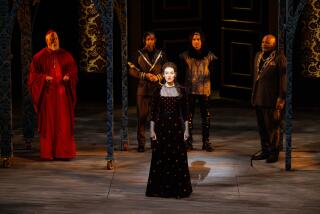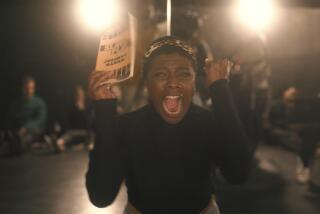COMEDY TO CAESAR SHIFT EASY FOR VETERAN ACTOR
SAN DIEGO — As long as it stays out of his eyes, nose and mouth, Earle Hyman doesn’t mind being spattered with blood in Act III. He always felt that, if he lived long enough, he would someday play Julius Caesar, so standing on stage “bedewed with blood” is just part of the job.
Besides, he loves peanut butter, the 59-year-old stage and screen veteran said. Mixed with Woolite and red coloring, it’s the secret ingredient of concealed “blood packs,” which burst at the prick of a sword.
Blood, of course, is essential to the political treachery in Shakespeare’s “Julius Caesar.”
The Old Globe’s production of the historical tragedy opened Friday night, staged in contemporary dress and cut to fit the intimacy of the Cassius Carter Centre Stage by co-directors Dakin Matthews and Anne McNaughton.
Hyman is probably most familiar for his recurring role as Bill Cosby’s father on “The Bill Cosby Show.” Although he loves being on the top-rated sitcom, which he describes as more like play than work, it doesn’t take long to realize how much Hyman enjoys and respects the rich, challenging vocal poetry of Shakespeare’s plays.
“I’ve done more Shakespeare than certainly any other black actor since the beginning of time, and that I’m very happy about,” he said. Counting his role as Edmund, Duke of York, in the Globe’s “Richard II,” which is being performed in summer repertory, Hyman has played 28 characters in 19 of Shakespeare’s plays. But he would never call himself a Shakespearean actor.
That was an insult in the 1940s when he started acting, the North Carolina native explained. It meant “a little on the hammy side, a little on the pretentious side, a little bit on the intellectual side,” he said.
“I hear a lot today, ‘How do you manage to play Shakespeare for people who don’t understand it?’ I say, ‘What the hell are you talking about? Shakespeare didn’t write not to be understood,’ ” the actor said. “So it’s a difference of 400 years and a few words have different meanings, but . . . the reason the play has lived is because people do understand . . . 400 years is nothing! We’re still the same kind of human beings, we still talk the same language.”
Shakespeare wrote his plays to be performed, not published, Hyman argued, and the spoken word is what is most important to any appreciation of his work.
“That’s why in a way I try to encourage my brothers and sisters to get into Shakespeare, not be afraid of it, because actually the black tradition is an oral tradition from Africa,” he said. “There were no books because of the humidity of the tropic temperatures and so forth, but there were men who remembered and were taught by men before them the entire history of this tribe’s civilization.
“That tradition still lives. For example, in the South where I come from the first words that meant anything to us were Elizabethan or Jacobean certainly, because they come from the Bible, translated in the King James version. (If) you’ve seen or heard a black minister . . . stand in that pulpit and say, ‘Now my text is from IISAAIAH, ‘ “ Hyman demonstrated with a rich, resonant inflection, “and he would read those lines in such a wonderful tone. . . . Boy! It was sensational.”
Hyman, who spent his teen-age years in Brooklyn, first got excited about theater when he was 5 years old, watching his mother in a church Christmas pageant.
“She walked down the aisle, she had no lines to say, but as she passed me. . . . I really felt that she wasn’t my mother, that she was Jesus’ mother, Mary,” he said. “I couldn’t get over that kind of magic, double thing, and theater still has that, it really does. . . . I have seen people on stage literally become who and what they said they were--get shorter, fatter, darker, lighter. That’s why I feel so strongly that all roles should be open to people--actors, fine artists--regardless of their ethnic origins.”
He is not the first black actor to play Julius Caesar. Six years ago Joseph Papp assembled an all-black cast for a production of the play in New York. Hyman played a smaller role in that company. The Globe production experiments with an interracial cast, doubled roles and some women playing men’s roles.
“But of course people are against (blacks) playing ‘classics’ anyway,” he said. “They don’t want to see a black man or woman playing anything but black.”
Hyman thinks maybe his early naivete about racism--his refusal to accept its existence--kept him working, building a solidly impressive 43-year career.
“I know many of my black brothers and sisters who were really great who simply didn’t get the opportunity and fell by the wayside,” he said, “or some of them got the opportunity and being more, let’s say, wise than I was, less naive than I was, fought against the injustices, but of course the powers that be shut them up. And either for nervous breakdowns or what have you, they simply didn’t work anymore.
“I’ve been blessed, I really have. I tell myself, even with the earthquake, ‘Well, Earle, if this is it, you can’t complain,’ ” he said, laughing.
Hyman has played hundreds of roles here and in his second-favorite country, Norway (“Because of Ibsen--the first play I saw (at 13) was ‘Ghosts’ and I fell like a ton of bricks for Ibsen.”), but he thinks he still has a lot to learn about acting, and the lessons come from experiences on stage--playing Julius Caesar, for instance.
“It’s a real challenge because he has so few words to say, and yet, obviously you’ve got to communicate something to the audience without words.
“What kind of man is a world conqueror? How does he talk?
“The only thing I do know about men of authority is that you don’t act strong, and mainly it’s how people react to you that makes you strong. You don’t yell at somebody, ‘Do this.’ You may not even look at them and somehow they know (they) have got to do it. . . .
“That’s strength in real life. How to do that on stage, I must learn.”
More to Read
The biggest entertainment stories
Get our big stories about Hollywood, film, television, music, arts, culture and more right in your inbox as soon as they publish.
You may occasionally receive promotional content from the Los Angeles Times.










